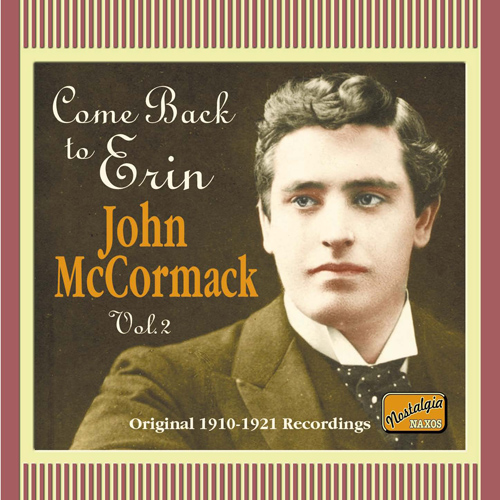McCORMACK, John: Come Back to Erin (1910-1921)
Tracklist
Falconer, Edmund - Lyricist
Studio orchestra (Orchestra)
Studio orchestra (Orchestra)
Barnard, Charlotte Alington Claribel
Studio orchestra (Orchestra)
Studio orchestra (Orchestra)
Moore, Thomas - Lyricist
Studio orchestra (Orchestra)
Studio orchestra (Orchestra)
Harry, Hamilton - Arranger
Campbell, Joseph - Lyricist
Studio orchestra (Orchestra)
Studio orchestra (Orchestra)
Shield, William - Lyricist
Studio orchestra (Orchestra)
Studio orchestra (Orchestra)
Moore, Thomas - Lyricist
Studio orchestra (Orchestra)
Studio orchestra (Orchestra)
Branen, Jeff T. - Lyricist
Studio orchestra (Orchestra)
Studio orchestra (Orchestra)
Moore, Thomas - Lyricist
Studio orchestra (Orchestra)
Studio orchestra (Orchestra)
Studio orchestra (Orchestra)
Studio orchestra (Orchestra)
Stanford, Charles Villiers - Arranger
McCormack, John (tenor)
Studio orchestra (Orchestra)
McCormack, John (tenor)
Studio orchestra (Orchestra)
Milligan Fox, Charlotte
Clay, Spencer - Arranger
McCormack, John (tenor)
Studio orchestra (Orchestra)
McCormack, John (tenor)
Studio orchestra (Orchestra)
Traditional - Lyricist
Studio orchestra (Orchestra)
Studio orchestra (Orchestra)
Ball, Ernest R.
Studio orchestra (Orchestra)
Studio orchestra (Orchestra)
Judge, Jack
Williams, Harry - Lyricist
Judge, Jack - Lyricist
Studio chorus (Choir)
Studio orchestra (Orchestra)
Rogers, Walter B. (Conductor)
Studio chorus (Choir)
Studio orchestra (Orchestra)
Rogers, Walter B. (Conductor)
Blossom, Henry - Lyricist
Studio orchestra (Orchestra)
Herbert, Victor (Conductor)
Studio orchestra (Orchestra)
Herbert, Victor (Conductor)
Sanders, Alma M.
Pascoe, Richard - Lyricist
Studio orchestra (Orchestra)
Pasternack, Josef A. (Conductor)
Studio orchestra (Orchestra)
Pasternack, Josef A. (Conductor)
Redding, Joseph P. - Lyricist
Studio orchestra (Orchestra)
Pasternack, Josef A. (Conductor)
Studio orchestra (Orchestra)
Pasternack, Josef A. (Conductor)
Phelps, Marion - Lyricist
Rattay, Joseph (violin)
Studio orchestra (Orchestra)
Pasternack, Josef A. (Conductor)
Rattay, Joseph (violin)
Studio orchestra (Orchestra)
Pasternack, Josef A. (Conductor)
Hughes, Herbert - Arranger
Schneider, Edwin (piano)
Schneider, Edwin (piano)
Schneider, Edwin (piano)
Schneider, Edwin (piano)
Sanders, Alma M.
Pascoe, Richard - Lyricist
Studio orchestra (Orchestra)
Pasternack, Josef A. (Conductor)
Studio orchestra (Orchestra)
Pasternack, Josef A. (Conductor)

John McCormack was the fourth of eleven children born to parents who worked in the Athlone Woollen Mills. After early education from the Marist Brothers in Athlone he attended Summerhill College, Sligo and joined the Palestrina Choir of Dublin Cathedral in 1902, receiving singing lessons from the choirmaster, Vincent O’Brien. The following year he won the gold medal in the tenor section of the National Music Festival (Feis Ceoil) in Dublin and began to make concert appearances.
During 1904 McCormack made not only his American debut, at the St Louis Exposition, but also his first gramophone recordings (for Pathé and the Gramophone and Typewriter Company). He travelled to Milan in 1905 to study with Vincenzo Sabbatini, who helped him to perfect his phenomenal breath control, and made his operatic stage debut during January 1906 at the Teatro Chiabrera, Savona, as Fritz / L’amico Fritz. He returned to Italy in 1909 to sing Alfredo / La traviata at the San Carlo, Naples, followed by Tonio / La Fille du Régiment at Parma opposite Tetrazzini in 1910.
Meanwhile McCormack first appeared at the Royal Opera House, London in October 1907 as Turiddù / Cavalleria rusticana, thus becoming the theatre’s youngest principal tenor. This role was followed by the Duke / Rigoletto and Don Ottavio / Don Giovanni. His popularity was confirmed by his annual return to London’s summer seasons of opera up to 1914, in roles such as Edgardo / Lucia di Lammermoor, Rodolfo / La Bohème, Almaviva / Il barbiere di Siviglia, Pinkerton / Madama Butterfly, Roméo / Roméo et Juliette, Cavaradossi / Tosca and Elvino / L’elisir d’amore.
In New York McCormack’s debut came in November 1909 at the Manhattan Opera House as Alfredo, the role in which he also first appeared at the Metropolitan Opera in November 1910. McCormack however gave only a few performances at the Met: Rodolfo in 1917 and Pinkerton and Cavaradossi in 1918. He did appear also with the Chicago Opera during the 1910–1911 season and played Paul Merrill in the Philadelphia world premiere of Victor Herbert’s Natoma opposite Mary Garden in 1911, the year in which he toured Australia with Dame Nellie Melba. With only limited success as an actor, from 1912 onwards McCormack gradually moved from the operatic stage to the concert platform. His final operatic appearance was in 1923 at Monte Carlo, in Nikolai Tcherepnin’s version of Mussorgsky’s Sorochintsy Fair.
His career as a recitalist, which involved much touring, was greatly supported by his success as a recording artist, notably with the related Victor and HMV labels for whom he recorded from 1910 onwards. His record sales grossed well over five million dollars annually for thirteen years, reflecting his wide choice of repertoire (and therefore markets); and when his royalties from recordings exceeded even those of Caruso, he was warned by his Neapolitan friend not to let this happen again!
In 1917 McCormack became a naturalised American, working very closely and continuously with the accompanist Edwin Schneider from 1920 onwards. After an absence of ten years he returned triumphantly to London in 1924 to give a recital at the Queen’s Hall. In 1927 he moved into Moore Abbey, Co. Kildare, Ireland and in 1930 purchased Runyon Canyon in Hollywood, having seen the estate while filming the musical Song o’ My Heart.
Around 1930 McCormack began to experience vocal decline. He made his American farewell appearance at Buffalo in 1937 and gave his last English concert at the Royal Albert Hall in 1938. During World War II he came out of retirement to raise funds for the Red Cross and continued to record until 1942.
As a recitalist McCormack’s repertoire ranged from operatic arias to traditional ballads, all of which he sang with incomparable vocal ease, rich tone, elegant phrasing and outstanding diction. The accompanist Gerald Moore said of his success ‘…the secret of his hold on the vast public was his sincerity. If he could not sing a song with conviction he would throw it away. Every song had to have some special message for John.’
© Naxos Rights International Ltd. — David Patmore (A–Z of Singers, Naxos 8.558097-100).































